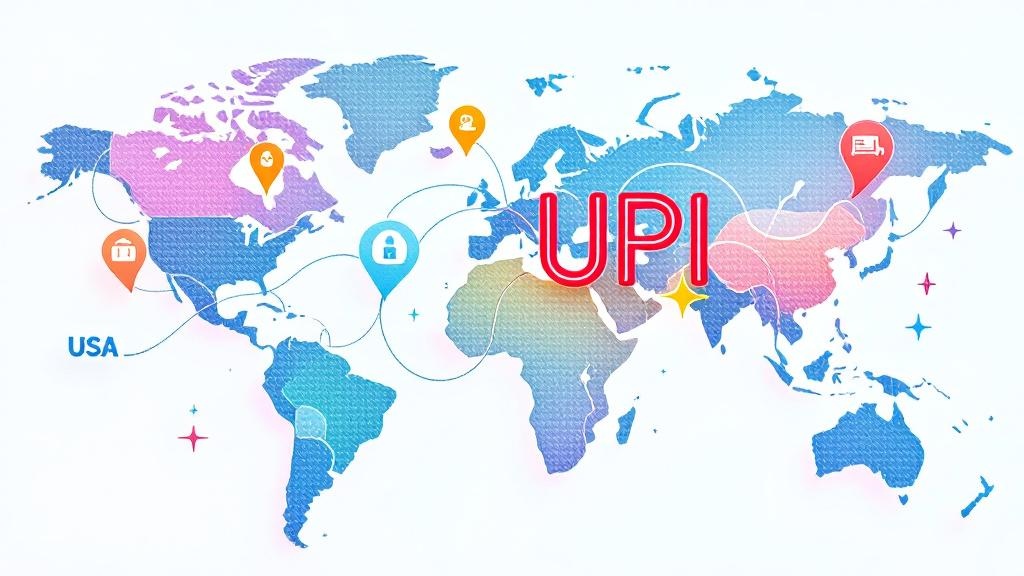In recent years, Unified Payments Interface (UPI) has revolutionized the way India handles domestic payments. This instant, secure, and convenient payment system has gained immense popularity, not just within India, but also across the world. With the rise of global connectivity and the need for seamless international transactions, many people are asking: UPI international transactions
In this article, we’ll explore the possibilities of UPI international use, discuss how UPI works for international users, and delve into its potential for UPI payments abroad. Whether you’re a non-resident Indian looking for ways to send money back home or a business owner interested in international e-commerce, we’ve got you covered!
What is UPI international transactions?
Before we dive into the details of UPI international usage, it’s essential to understand what Real-time Payment System is. Launched by the National Payments Corporation of India (NPCI) in 2016, UPI has become the backbone of India’s digital payment system. It allows users to transfer money instantly between bank accounts using a mobile phone. The platform is highly secure and offers a seamless transaction experience, enabling instant payments, whether you’re paying for groceries, services, or even sending money to loved ones.
With UPI’s growing prominence in India, the question arises: can Real-time Payment System be used beyond Indian borders? Let’s explore this in more detail.
Real-time Payment System for International Transactions: The Current Landscape
UPI Usage in Foreign Countries: Is It Possible?
At present, UPI usage in foreign countries is not as widespread as it is in India. However, there are some significant advancements that suggest Real-time Payment System could soon become an integral part of global payments. Currently, UPI payments beyond India are limited. However, some international remittance companies and fintech apps are beginning to integrate Real-time Payment System for sending money from foreign countries to India.
UPI International Usage for Non-Residents
For non-resident Indians (NRIs) or people working abroad, UPI for international remittances offers the possibility of easily sending money to family and friends back in India. This method is particularly appealing because it offers instant transfers, unlike traditional methods such as international wire transfers or remittance apps, which often come with delays and high fees.
Several companies have introduced Real-time Payment System-based services for remittance from abroad, including partnerships with foreign banks and payment platforms. For example, services like Western Union and MoneyGram are increasingly exploring UPI as a way to streamline cross-border payments. This means that, while UPI is not yet a fully established tool for UPI international transactions, it is starting to gain traction in the global remittance market.
Can You Make UPI Payments Abroad?
While Real-time Payment System has primarily been a domestic payment tool in India, recent developments indicate a shift toward enabling UPI payment abroad. The potential for international transactions via Real-time Payment System is becoming more apparent, thanks to India’s partnerships with international payment giants.
The Role of UPI for International E-Commerce
As UPI for international e-commerce evolves, we are starting to see global merchants, particularly those operating in India, adopt Real-time Payment System as a payment option for their customers. For example, Indian online shopping platforms that have international buyers may begin accepting Real-time Payment System payments. However, it’s important to note that UPI payments to foreign businesses are still not as widely accepted as credit card or PayPal transactions. Still, UPI for international users can be expected to become a growing trend in the coming years.
UPI International Payments for Cross-Border Transactions
Currently, UPI transaction fees for international payments are not standardized, as Real-time Payment System is primarily designed for domestic use. However, UPI-based remittance services are becoming more popular because they tend to offer lower fees than traditional international money transfer services like Western Union or SWIFT. Given its convenience, lower transaction costs, and faster processing times, Real-time Payment System could soon become a preferred payment option for secure payment methods in international fintech solutions.
UPI and Foreign Exchange: A Look into the Future
Another critical aspect of UPI international usage is its potential integration into foreign exchange (Forex) services. Real-time Payment System could be a game-changer for foreign exchange transactions, enabling more secure and instant cross-border currency exchanges. This development is especially relevant for travelers and businesses engaging in global trade.
UPI and Forex Platforms
Some international fintech solutions and online banking services are starting to integrate Real-time Payment System into their platforms to enable quick transfers of funds. UPI’s potential to allow instant payments across borders would be a significant advantage for international wire transfers, especially when it comes to sending money in real-time to countries other than India.
UPI Abroad Security: How Safe Are International UPI Transactions?
Security is a major concern when it comes to international transactions. Since Real-time Payment System transactions are already highly secure within India, many believe that the same levels of security can be applied when UPI is used internationally.
UPI’s Built-In Security Features
Real-time Payment System transactions are secured with two-factor authentication (2FA) and end-to-end encryption. These features will ensure that UPI abroad security remains top-notch, even for international payments. As the system becomes more widely adopted, additional measures may be taken to ensure the safety of cross-border payments, particularly as mobile banking and secure payment methods gain more popularity worldwide.
UPI Transaction Fees for International Payments
When it comes to international transaction fees, Real-time Payment System has the potential to offer a more cost-effective solution compared to traditional methods like international wire transfers. Cross-border remittances and money transfer apps often involve hefty transaction fees, which can be as high as 5-7% in some cases.
In contrast, UPI is designed to minimize transaction costs. While there may still be some nominal fees for UPI international payments, they are likely to be much lower than other traditional payment methods. For this reason, UPI’s role in global remittances and international payments looks promising.
How UPI Could Impact Global Finance
With the world becoming more interconnected and the rise of digital payment systems, UPI has the potential to disrupt the way cross-border payments are made. India’s strong digital ecosystem, combined with UPI’s low fees and high security, positions it to play a major role in the future of international fintech solutions. Whether it’s for sending money to loved ones, conducting business, or even paying for products across borders, UPI is on its way to becoming a game-changer in the global payments market.
FAQs on UPI for International Transactions
1. Can I use UPI to make international payments?
Currently, UPI is primarily designed for domestic transactions within India. However, its use for international payments is gradually expanding, especially through remittance apps and international partnerships.
2. Are there fees for international UPI transactions?
Yes, while UPI is known for its low fees for domestic transactions, UPI transaction fees for international payments are still being developed. However, the fees are expected to be lower than traditional payment methods like international wire transfers.
3. How can I use UPI for remittances from abroad?
Some remittance services and fintech apps are now allowing users to send money from abroad using UPI. These platforms are typically integrated with Indian banks and offer a simple way to transfer funds internationally.
4. Is UPI secure for international transactions?
Yes, UPI transactions use strong encryption and two-factor authentication, ensuring that payments made abroad are secure. UPI’s security features make it an ideal choice for mobile banking and secure payment methods globally.
5. Can UPI be used for international e-commerce?
At present, UPI for international e-commerce is limited, but some online stores catering to Indian consumers may begin accepting UPI as a payment method. This is expected to grow as UPI’s global adoption increases.
6. What are the advantages of using UPI for international payments?
The primary advantages of using UPI for international payments include lower transaction fees, instant processing, and a higher level of security compared to traditional methods like international wire transfers.
7. How will UPI affect global finance in the future?
As UPI’s global usage expands, it has the potential to disrupt the traditional financial systems by offering faster, cheaper, and more secure alternatives for international wire transfers and money transfers.
Conclusion
UPI international use is still in its early stages, but the future looks promising. As more countries and businesses adopt UPI as part of their global payment strategies, we will likely see increased accessibility and broader adoption. With its ability to offer secure payment methods, low fees, and real-time transactions, UPI is set to become a key player in the future of international fintech solutions. Whether you are looking to send money home or make purchases from abroad, UPI for international users is a tool worth watching.








Comments (0)